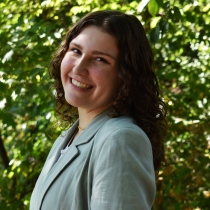Goodwin covers communications for rheumatology, orthopedic surgery, physical medicine and rehabilitation, and radiology. She assists with communications for C.S. Mott Children’s Hospital and Von Voigtlander Women's Hospital. She is passionate about making medical research and storytelling accessible to help keep patients informed about what is happening in healthcare. Goodwin graduated from Eastern Michigan University with a degree in Public Relations in 2022. Contact: [email protected]


Health Lab
Many organs that are ready for donation are discarded for various reasons. The Organ Procurement and Transplant Network is finding ways to combat this to increase the number of transplants done per year.

Health Lab
Michigan teen Jake Juip becomes 100-meter Michigan state high school champion in adaptive track and field race using adaptive equipment designed to meet the needs of his rare neuromuscular condition.
News Release
This year’s Blood Battle includes a new way to participate for those not able to donate on U-M’s campus.

Health Lab
A policy to save Medicare money and speed up the move from hospital-based to outpatient-based operations is not having the desired impact and could be creating an increase in administrative workload, causing potential delays in care.

Health Lab
After a fall broke her painting hand, Susie McColgan's Michigan Medicine surgeon created an individualized surgical solution that would get her back to her life's work of 25 years.

Health Lab
GLP1RA drugs are used to treat obesity as well as type 2 diabetes. Research from University of Michigan Health finds that these drugs can also be effective in treating high iron levels, a cause and symptom of type 2 diabetes.

Health Lab
After undergoing brain surgery as a child, Glenn Ratledge is now working as the ball boy for the Detroit Pistons and has been seizure free for 13 years.

Health Lab
Using the Ab38 antibody to target the CD38 enzyme could be a new gateway to treat and prevent fibrosis for patients with systemic sclerosis.

Health Lab
Targeting and blocking the sCD13 protein from interacting with the B1R protein can pave the way for new fibrosis and systemic sclerosis treatments.

Health Lab
A research team is investigating how metabolism – the process by which cells turn sugars, fats and proteins into energy – is used to make NETs in regards to antiphospholipid syndrome.

Health Lab
Research finds that adults living with cerebral palsy had a very high occurrence of pain, with 90% having a pain history and 74% having multiple diagnoses of pain coming from different origins such as the lower back, irritable bowels, joint arthritis and chronic headaches.

Health Lab
Exploring the main topic of concern patients have when it comes to the results of their treatment for inducible laryngeal obstruction can help to increase effective treatment methods.

Health Lab
A young girl works with physical therapists and other specialists in two unique clinics to regain strength again after a rare brain hemorrhage.

Health Lab
A kid's orthopaedic surgeon and sports medicine specialist gives parents tips to make sure their children get the care they need when injured and have an effective recovery.

Health Lab
First metatarsophalangeal arthrodesis procedures are a common surgical intervention used to treat pain associated at the first metatarsophalangeal joint associated with degenerative changes. Michigan researchers reviewed standing research on how long it took for patients to return to physical activities after first metatarsophalangeal arthrodesis to find an average time frame that could be given to patients for how long it takes.